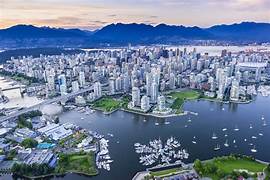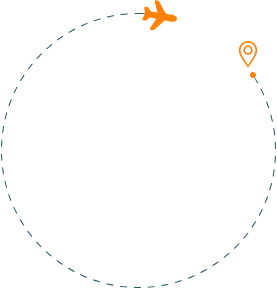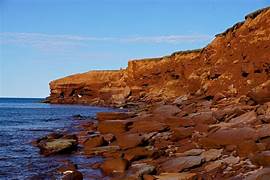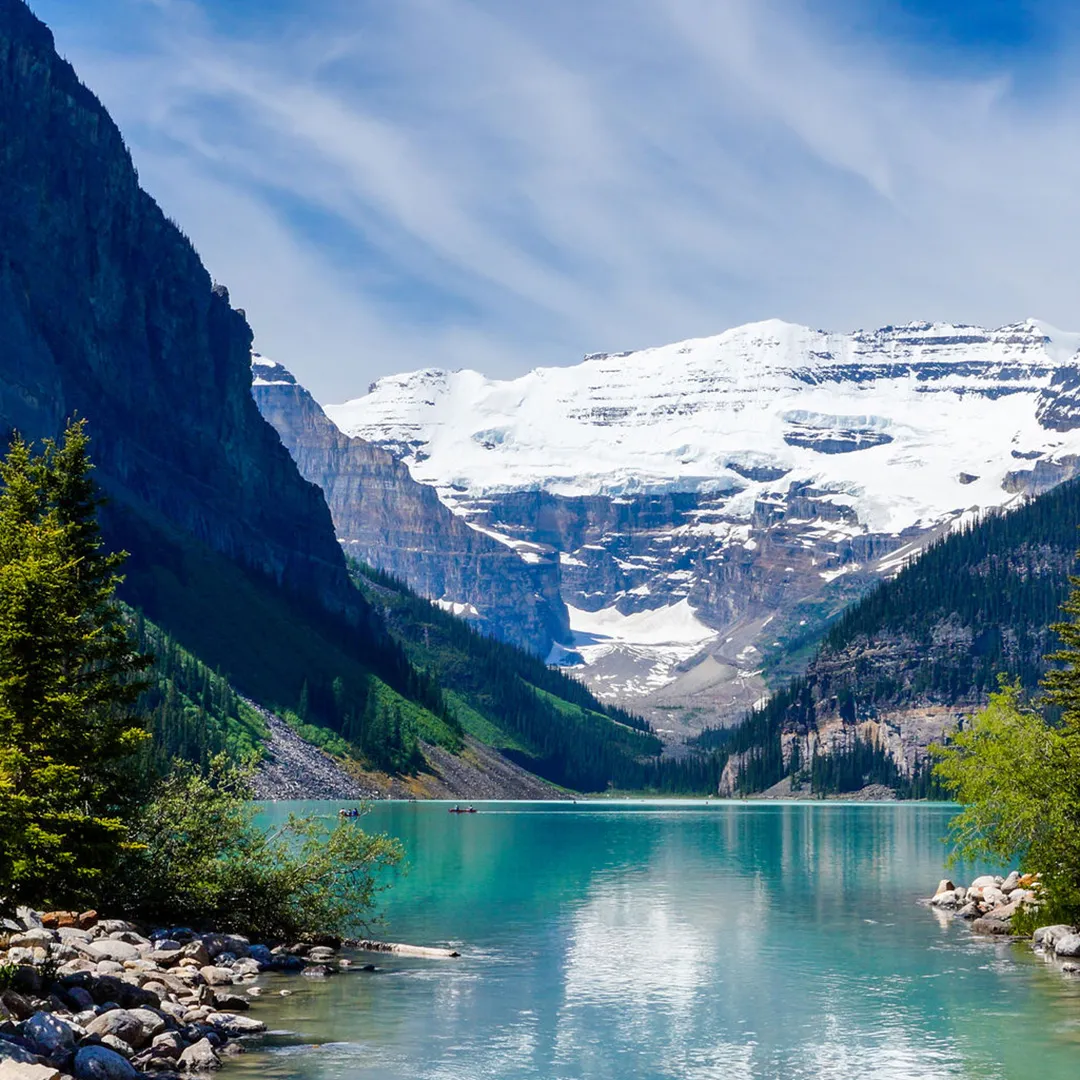"Known for its magnificent mountains, sparkling ocean vistas, and lively cosmopolitan appeal, Vancouver is a beautiful coastal metropolis in Canada. This city offers a perfect blend of stunning landscapes, historical sites, and a wide range of cultural activities. Vancouver is a must-see location due to its vibrant arts community, great food, and outdoor activities. The allure of Vancouver never wanes, whether you're taking a stroll through Stanley Park, discovering Granville Island, or admiring the stunning panorama from Grouse Mountain.
The overall best time to visit Vancouver is from May to September when the weather is at its warmest and you have the least chance of getting caught in the rain.
Although Vancouver is in Canada, it actually has a mild climate thanks to the maritime effect of the Pacific Ocean.
The Vancouver International Jazz Festival is one of the significant events held during this time, which is the city's driest month.
Even though summer is the height of tourist season, it's a great time to enjoy activities like whale watching and discovering colorful neighborhoods, which makes for an interesting trip full of cultural and natural landmarks.
Between May and September, when the weather is at its warmest and there is the least likelihood of rain, is generally the greatest time to visit Vancouver. Due to the Pacific Ocean's maritime influence, Vancouver, despite being located in Canada, has a relatively moderate climate.
It has warm summers and moderate winters. The sole drawback is that Vancouver also receives a lot of rain due to the maritime effect. Summer is the best season to come if you want to spend a lot of time outside.
The Vancouver tourism board claims that whale watching season runs from March through October, with the busiest time for orcas being in the summer. If a popular cultural event takes place outside, it may also be seasonal.
The Richmond Night Market, a street food haven with a variety of Asian delights, is open only from April to October. Missing this quintessential Vancouver experience would be a pity. Some of the city's most well-liked festivals take place during the summer.
Optimal Times:
- Summer (June through August): There are many festivals and activities throughout the city. The weather is ideal for outdoor activities since it's pleasant with highs between 20°C and 25°C.
– Valley Seasons:
– Winter (December to February): Less busy for tourism, with lower temperatures ranging from 1°C to 7°C and fewer crowds. This is a fantastic moment to partake in winter activities on the neighboring mountains.
– Mid-Seasons:
– Spring and Fall: These seasons, as previously stated, have pleasant temperatures and less tourists.
Seasonal Variations and Weather Conditions
The moderate temperatures that prevail in Vancouver throughout the year are a defining feature of the city's climate. Winters are moderate with sporadic precipitation, but summers are pleasantly warm. The wettest months are November through March, with an average yearly precipitation of about 1,500 mm."
"You're in for a unique experience if you're a family planning a summer vacation to Vancouver. This seaside city, which offers sunny skies, mountain views, and enough family-friendly activities to fill your entire itinerary—and then some—combines outdoor enjoyment with cultural diversity.
Vancouver is stunning at any time of year, but the summer months are the most stunning! Encircled by water and thick woodland, it becomes a center of activity during the warmer months.
Expect to see more tourists than normal during the summer, which is Vancouver's busiest travel season. Due of its popularity with tourists, this place is busier than usual during the peak season. You'll see greater crowds and longer queues, as well as increased prices.
Explore a variety of beaches, mountains, cuisine, culture, and the possibility of seeing a bear or whale for the top summertime activities in Vancouver. The British Columbia rains are long gone thanks to Vancouver's summers, so let's make plans for fun splashes and sun-kissed adventures.
There are many ways to enjoy Vancouver's natural beauty, but summer is the greatest season to do it. A few family favorites are as follows:
Festivals and Events: During the summer, you can take in the Vancouver International Jazz Festival, Bard on the Beach, the Celebration of Light fireworks, and many other events.
Diverse Community: Chinatown, Kitsilano, and Little Italy are well-suited for neighborhood summer events that honor pluralism and hospitable residents.
Magnificent Natural Beauty: Our city's stunning combination of mountains, ocean, and verdant parks like Stanley Park and Queen Elizabeth Park is best enjoyed on hotter days.
Outdoor Adventures: There's never a better time to go whale watching, kayak in False Creek, trek the Grouse Grind, test your mettle on the Capilano Suspension Bridge, or unwind at Kitsilano Beach.
Culinary Scene: At Granville Island and other waterfront eateries, now is the ideal time to sample fresh local produce and seafood (sockeye salmon and spot prawns.
Make your way to Capilano Suspension Bridge Park and stroll through the rainforest canopy. Kids will appreciate seeing wildlife or participating in seasonal activities like Hoppy Heights or Canyon Frights (if you come in the fall), and the Cliffwalk and Treetops Adventure is an amazing experience.
Take a train ride in Stanley Park. It's a summertime custom that both children and adults enjoy. After that, go to the nearby water park and playground or the Vancouver Aquarium.
Among the best things about summer travel? Families have more time to create memories together without having to rush from one location to another because the daylight lasts far into the evening.
Patio hopping is a summertime pastime among Vancouver residents! It's a terrific place to spend an afternoon or evening, and many of the greatest bars, restaurants, and breweries in Vancouver have outside patios. You can start from wherever you are and patio hop spontaneously around the city.
How many other large cities give you the opportunity to witness the most magnificent marine life on Earth? The best time to see grays, orcas, and even humpback whales is in the summer. From downtown Vancouver, take a short catamaran tour.
Magnificent Natural Beauty: Our city's stunning combination of mountains, ocean, and verdant parks like Stanley Park and Queen Elizabeth Park is best enjoyed on hotter days.
Outdoor Adventures: There's never a better time to go whale watching, kayak in False Creek, trek the Grouse Grind, test your mettle on the Capilano Suspension Bridge, or unwind at Kitsilano Beach.
Culinary Scene: At Granville Island and other waterfront eateries, now is the ideal time to sample fresh local produce and seafood (sockeye salmon and spot prawns.
"In winter, Vancouver is unlike any other place in Canada. It's a city where you may welcome the rain, find comfortable places to warm up, or escape to winter adventures just a short drive away because of its pleasant weather, verdant surroundings, and neighboring snow-capped mountains.
Here, winter is about being prepared for everything, not about frigid weather. I'll outline expectations, weather preparation tips, and the best methods to take in Vancouver's winter charm at your own leisure in this guide.
The majority of the rain falls in the city, but if you go to the mountains, such as Grouse, Cypress, or Mount Seymour, you'll discover snow-covered slopes that are ideal for winter activities like skiing and snowshoeing.
A quick drive to higher elevations provides snow lovers with a traditional winter wonderland experience. One of the most distinctive winter aspects of Vancouver is the contrast between the city's wet charm and the snowy majesty of the mountains.
Locals and visitors alike benefit greatly from Vancouver's winter climate, which is both entertaining and fascinating. To ensure that your trip to Vancouver is unforgettable, include these enjoyable winter activities on your agenda.
Even though there isn't much snow in this region of Canada, people travel to Vancouver in the winter to go skiing. This is an activity that many locals and tourists engage in. Many people can be seen looking for some of the popular cross-country and downhill ski services, which are fairly accessible.
The Stanley Park Seawall is a traditional wintertime attraction, rain or shine. Admire the views of Lions Gate Bridge and the North Shore Mountains as you stroll along the shore. Take a coffee to-go and enjoy Vancouver's serene, foggy winter splendor.
Visit Lafarge Lake in Coquitlam, where themed light shows encircle the lake, for free winter pleasure. Another favorite is history Christmas at Burnaby Village Museum, which features history buildings and charmingly adorned streets with a touch of the past.
Whistler has plenty to offer in the winter, regardless of whether you're a serious skier or snowboarder or would rather avoid the slopes. Explore top-notch ski areas, pamper yourself to a soothing spa treatment, or savor exquisite dining in Whistler Village throughout the day.
An hour from Vancouver, Squamish is a place where winter charm blends with untamed wildlife. The majority of tourists stop here on their route to Whistler, but doing so offers you special experiences that go beyond the norm.
The Wonders of Frost at Shannon Falls
In the winter, this famous waterfall becomes a frosted masterpiece. The family-friendly stroll to the viewing platform makes for a brief but worthwhile visit.
The winter ziplining experience is one that will stick in your memory. You will be in awe when you zipline across the snow-covered hill at the summit of Grouse Mountain.
Starting in December, the events in Vancouver in winter will make your vacation here more happening, giving you a reason to remember your visit to Canada. The Christmas festival celebrations are pretty long, as the vibe can be felt from the day of Thanksgiving. However, during the winter months in Vancouver, you’ll get to be a part of more events than just the day of Christmas.
"When visiting Vancouver, the average tourist spends $165 (CA$227) per day. Based on other tourists' costs, this represents the typical daily cost of a Vancouver vacation.
A week in Vancouver typically costs between $1,230 and $2,357 ($176 and $337 a day) for one person. $52 to $106 per day for one person's daily expenses for food, travel, and sightseeing Economy flights range from $332 to $679. Accommodations: a two- or three-star hotel room for $118 to $156 per night
Around $107.27 USD (or $144.11 CAD), you should budget roughly $720.55 for five days in Vancouver to cover the essentials.
On average, previous visitors have spent one day:
$54 for meals (CA$74)
$15 for local transit (CA$20)
$174 (CA$239) for accommodations
Budget travelers in Vancouver typically spend $60 (CA$82) per day, mid-range travelers spend $166 (CA$227), and luxury travelers spend approximately $499 (CA$685). These prices are based on what past visitors to Vancouver have reported spending.
"Naturally, in order to gain entry at customs and immigration, whether at an airport or a border crossing from the United States, you must have a valid passport if you are traveling to Vancouver from another nation.
A visa-waiver scheme is in place between Canada and certain nations. This implies that, at the discretion of the immigration officer, people of specific nations will be allowed admission for a maximum of six months without having to apply for a visa.
ID with photos
When visiting Vancouver (or elsewhere in Canada, for that matter), you should always have a photo ID on you. Although it is uncommon for the police to stop you without a valid reason, they will request to see photographic identification if they do. If you have your passport, this will suffice, otherwise a national identity card, or perhaps a photographic driver’s license, would be adequate.
"Applicants need to understand the costs associated with the Canada visa application procedure. The associated fees vary depending on the type of application. It's critical to stay informed about the current fees in order to plan your immigration trip, regardless of whether you intend to sponsor family, seek for permanent residence, or visit temporarily.
The several kinds of Canada visa costs are as follows:
1. Short-Term Housing Charges
Visitors, students, and temporary employees who want to stay in Canada for a brief period of time are subject to temporary residence fees. The balanced spread of fees is defined by the several classifications of visa: Tourist Visa (Temporary Resident Visa), Student Visa, and Work Permit. These may be accompanied by additional fees for biometrics and other third-party services.
2. Fees for Permanent Residence
People who intend to live in Canada permanently are required to pay permanent residence costs. There are expenses associated with permanent residency for several applications, including Family Sponsorship, Provincial Nominee Program (PNP), and Express Entry. Processing fees, right of permanent residency fees, and other related expenses are usually included in this.
Fees for Citizenship
The payments that permanent residents must pay when they are getting ready to seek for Canadian citizenship are known as citizenship fees. Application fees, citizenship test fees, and the issuance of the citizenship certificate are typically required for these expenses. Typically, children's applications cost less than those for adults.
Fees for Additional Applications and Services
Other later fees include biometrics collection, visa extension, restoration of status, and travel document issuance as respects immigration charges. Depending on the type of service and status of each, the fees under various headings vary significantly.
A Temporary Resident Visa (TRV), commonly known as a Canada Tourist Visa, provides a temporary travel experience and a way of life in Canada. Single-entry and multiple-entry visas are available, each with a different price.
Many factors affect the overall cost of applying for a Canadian visa, including:
Visa Type: The costs associated with various visa categories vary.
Biometrics: The use of fingerprints and photos may result in an additional expense.
Medical Tests: You may be required to undergo medical exams in order to obtain your visa.
Processing Time: Urgent or expedited processing typically carries an additional cost.
Currency fluctuation: There may be variations in the rates at which fees are paid in local currency.
Pro Tip: To guarantee cost reduction, keep an eye on exchange rates and biometric requirements.
Other Expenses to Take Into Account for Visitor Visas
These are some extra expenses to take into account while paying for a visiting visa to Canada.
The visitor visa biometric fee is approximately fifty Canadian dollars (CAD).
The cost of medical tests varies by nation and is determined by the necessary examinations.
Police certifications are subject to the issuing authority.
"There is something for every type of palate in Vancouver, a city that is quietly but swiftly becoming known as Canada's culinary capital. Every visitor can discover something they enjoy within the list of some of the most well-known Vancouver cuisines, which range from sweet French and spicy Asian to fusion Japanese and fragrant Indian. There are so many food options in Vancouver that visitors will be licking their tongues and biting their fingers. This city's culinary culture is characterized by a wide range of options, from fine dining establishments to street food. Plan your trip to Vancouver right away to satisfy your ravenous inner souls like never before!
Vancouver is the place to go if you want to eat some of the most delicious and mouthwatering food while on vacation. Vancouver food has led the city to rank at the top of the list when it comes to choosing the food capitals of the famous alley of the United States of America, Canada. Vancouver's cuisine, which ranges from savory and sweet to spicy and tangy, suits every palate, leaving diners wanting more and more.
Vancouver is the dream come true for people who seek out food not only to satisfy their hunger but also to enjoy its flavors, textures, mouthfeel, and aromas. Check out some of the well-known dishes from Vancouver, Canada, that visitors should not miss while living there.
After indulging in the food offered at restaurants in this multicultural metropolis, one can never stop at just one bite. Vancouver, which is frequently referred to as a foodie's paradise, is home to some of the best chefs in the nation and serves delicious cuisines ranging from Vietnamese to contemporary.
Vancouver offers a wide variety of local and street delicacies. Le Tigre, La Boheme Creperie, Yolks, Japadog, Mangal Kiss, and Tacofino are a few of the well-liked local dishes. What is the most well-liked food item in Vancouver? Seafood and salmon candy are the things that people enjoy and consume the most.
JapaDog
JapaDog is a hot dog with an amazing twist that was inspired by Japan, another global culinary powerhouse. Established a few decades ago by an immigrant couple, Japadog has gained the affection of both residents and visitors. In Vancouver, Canada, JapaDog is an irresistible street snack that combines a variety of sweet, spicy, and salty flavors with the use of seaweed flakes, teriyaki sauce, wasabi, kimchi, and miso sprinkled over a hot dog made of pig, beef, turkey, or veggies.
Salmon Candy
Because of the seafood that is served there, Vancouver cuisine is undoubtedly becoming one of the best. Once a visitor or local tastes salmon candy, they will find it tough to quit eating. The salmon candy, which is made by smoking the salmon and glazing it with the well-known maple syrup, oozes out the flavors of sweet, salty, and smokey all at once, making it hard to resist being addicted. A fish-lover could be converted by the way maple syrup counterbalances the saltiness of smoked salmon!
Lamb Popsicles
Lamb popsicles, which are served at Vikram Vij's restaurant, are unquestionably one of Vancouver's must-try Indian dishes. Lamb popsicles are one of the chef's many specialties; they taste like nothing you've ever tasted. The white wine, mustard, and Indian spices used to marinate the pink racks of lamb are not a mouthful. Diners can enjoy the dish with their eyes and noses thanks to its beauty and aroma. Even those who aren't hungry can be tempted by the aroma of this dish!
Nanaimo Bars
Serving the palates of everyone with a sweet tooth, Nanaimo Bars are undoubtedly one of the most well-liked treats among the residents. The best way to enjoy this Vancouver cuisine is with a delicious cup of coffee. The base of this incredibly delicious bar is made of chocolate graham cracker coconut, followed by a creamy custard in the middle, and a rich and luscious chocolate ganache on top. Offering an outstanding combination of crispy and soft bite, Nanaimo Bars are undoubtedly a must-try!
Cream Puffs
The French dessert known as profiteroles, or cream puffs, is a taste that must be learned. This Vancouver cuisine is so soft and crispy that it melts in your mouth and is well-known among over half of the population. These puffs, which are filled with a wide variety of flavored icings and creams, are so light and fluffy that they make foodies everywhere swoon. With so many varieties available in Vancouver, such as matcha, salted caramel, lychee-rose, raspberry, and many more, it's hard to resist trying these confections.
B.C. Roll
B.C. Rolls, another Japanese-inspired dish from Vancouver, are sushi with a touch of local flavor. When residents are asked to pick their top five favorites, B.C. Roll can be included in the long list. This dish's fame stems from its elegance and simplicity. This dish is made with cucumber, smoked salmon, and sweet sauce. It is then grilled with the skin on, making it simultaneously crispy and moist, making the tasters' tongues tingle.
Dungeness Crab
Dungeness crab, another of the most popular seafood, is a delicious and healthful dish in Vancouver. Dungeness crab, the most popular crustacean in Vancouver, is the ideal lunchtime meal. Dungeness crab, which can be found in a variety of eateries throughout the city, ought to be at the top of the list for tourists hoping to sample the best seafood the area has to offer. The final meal, which is made by roasting the crab in butter, white wine, parsley, and other flavorful seasonings, will make people salivate.
Pies
Pies are another of the most well-known desserts in Vancouver cuisine! Pie is a type of organic food that can be found in Vancouver, offering visitors the chance to experience the best of both worlds. It can be produced in both sweet and salty flavors.
"Roads, trains, waterways, and airplanes can all get to Vancouver. Air Canada is the main airline operating out of Vancouver International Airport, which links the city to the rest of the world.
Air Canada is the main airline operating out of Vancouver International Airport, which links the city to the rest of the world. Visitors can also take scheduled floatplane or helicopter flights from locations around Vancouver, such as the Gulf Islands or Whistler.
Renting a car or recreational vehicle (RV) is a simple and excellent choice, especially for individuals who want to stop along the trip and take in the scenery. Ferries are available for vehicles from the nearby islands, and Highway 1, also known as the Trans-Canada Highway, provides access to Vancouver from the east.
The best method to get to Vancouver is by rail, which is also the finest way to explore British Columbia. Travelers can take advantage of VIA Rail's transcontinental service, which runs three times a week, year-round, from Vancouver to Toronto, and take a two-day Rocky Mountaineer rail tour, which is available from April to October, to see British Columbia and Alberta.
Seattle, Victoria, Vancouver Island, Whistler, and the Okanagan Valley are among the places that buses connect Vancouver to.
Vancouver is connected by bus to the Okanagan Valley, Seattle, Victoria, Vancouver Island, and Whistler.
Cabs, vehicles, and public transportation like buses are the greatest ways to get around the city. The British Columbia public transportation system provides an excellent means of transportation across the city, and there are numerous scenic driving routes.
"




.jpg)